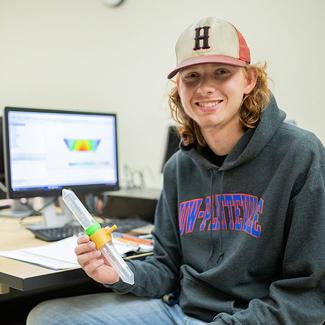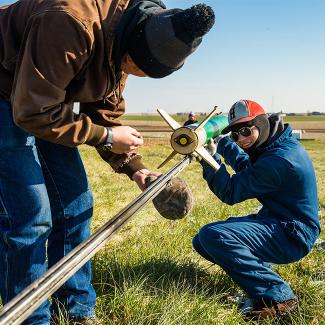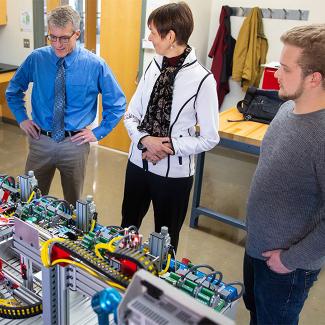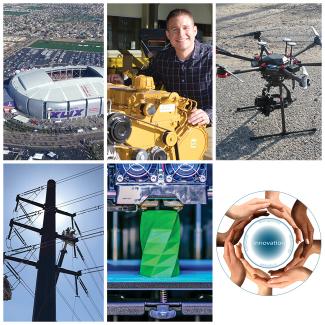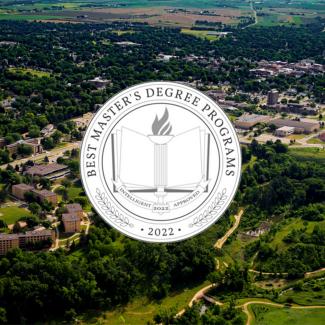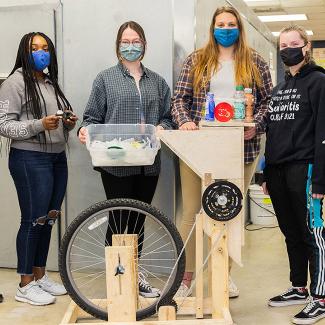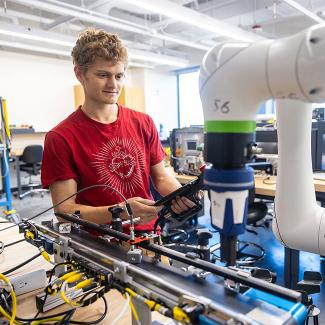What You’ll Learn As An Engineering Physics Major at UW-Platteville
The Engineering Physics program at UW-Platteville combines elements of mechanical and electrical engineering with advanced coursework in physics. As an engineer you’ll be ready to address multidisciplinary and non-traditional problems, and create solutions that can make our world healthier, safer, and more connected. If you want to help design a better future, start your journey at UW-Platteville.
The Engineering Physics program is accredited by the Engineering Accreditation Commission of ABET, https://www.abet.org, under the commission's General Criteria and Program Criteria for Engineering, General Engineering, Engineering Physics, and Engineering Science.
For students seeking to earn an engineering physics degree in Wisconsin, UW-Platteville is a smart investment. We offer the unique opportunity to gain specialized skills that will give you a competitive edge in the marketplace and propel you forward in your career.
The Engineering Physics Program’s Student Outcomes and Program Educational Objectives are available in the Undergraduate Catalog.
Our Engineering Physics program develops engineers with a broad technical background and solid foundation of core courses. You can also hone your skills with a concentration in engineering in controls, electronics, power systems, material science, mechanisms and machines, and thermo-fluid systems.
UW-Platteville stands apart from other programs because of our small class sizes and focus on hands-on learning. Our faculty members will work with you to ensure you learn the skills and knowledge you need to succeed in your future career.
Careers in Engineering Physics
As an engineering physics major, you have a wide range of career paths to choose from, with engineering jobs in fields such as:
- Automation/controls
- Mechanical design
- Electronics design
- Nuclear instrumentation
- Robotics
- Manufacturing quality control
- Medical devices
- Research and development
OUR GOALS FOR STUDENTS
At UW-Platteville, we prepare our engineering physics graduates to create and optimize engineering solutions through enhanced knowledge and integrated application of math, science and engineering principles. The bachelor's in Engineering Physics program also provides an excellent foundation for those intending to continue their education with a graduate degree in science or engineering.
Program graduates will be able to apply the principles they learned to solve complex problems; produce solutions designed to meet specified needs; communicate effectively with all types of audiences; recognize their ethical and professional responsibilities in engineering situations; function effectively as part of a leadership team; use their experimentation, collected data and judgement to draw conclusions; and acquire and apply knowledge on an ongoing basis, using strategies learned at UW-Platteville. Program alumni are accountable, well-respected leaders who can nimbly adapt to challenges and changes, leveraging their liberal studies, mathematics, science and engineering coursework to drive their success.

More than Memorization
Engineering physics at UW-Platteville is focused on experiential learning that connects your education to your future career. You will also have exciting opportunities to help others through various research projects.
A Unique Program
- Participate in ongoing research projects with faculty.
- Learn in state-of-the-art research lab facilities.
- Choose an area of concentration to round out your engineering physics education based on your career goals.
- Prepare for a successful career as an application engineer, product development engineer, materials coordinator, and more.
Are you curious about what classes you'll take? View a four-year plan for the Engineering Physics program.
About ABET Accreditation
Not all engineering physics colleges can say that their programs are accredited by ABET; the University of Wisconsin-Platteville is proud to be among the schools whose programs have met the stringent standards required to earn accreditation. This voluntary accreditation demonstrates that our Engineering Physics program meets the high-quality standards of the industry and profession. Accreditation also gives current and prospective students further assurance that their chosen degree program will prepare them for success in their future careers.
Areas of Concentration
One of the great advantages of the Engineering Physics program at UW-Platteville is the ability to tailor your major. A relatively large fraction of the required credits are professional electives that can come from other engineering disciplines. You are free to design your own professional path by selecting a coherent group of electives for a concentration.
Controls
Design systems that automatically control or regulate some physical quantity without human intervention.
Digital systems
Explore digital electronic systems ranging from basic devices to large-scale integrated circuits.
Electric power
Understand the development and distribution of power from small scale motors and generators to larger networks such as a power grid.
Electronics
Gain expertise in basic analog and digital electronic devices and systems including amplifiers, integrated circuits, oscillators, power supplies, motor drivers, and more.
Materials
Expand your understanding of the properties and applications of different types of materials such as metals, ceramics, and plastics for mechanical components and systems.
Mechanisms, machines, and systems
Design, analyze, and fabricate mechanical mechanisms and systems.
Thermal design
Design and analyze energy or thermo-fluid systems such as combustion engines; heating, venting and air conditioning (HVAC) systems; refrigeration systems; or power plants.

